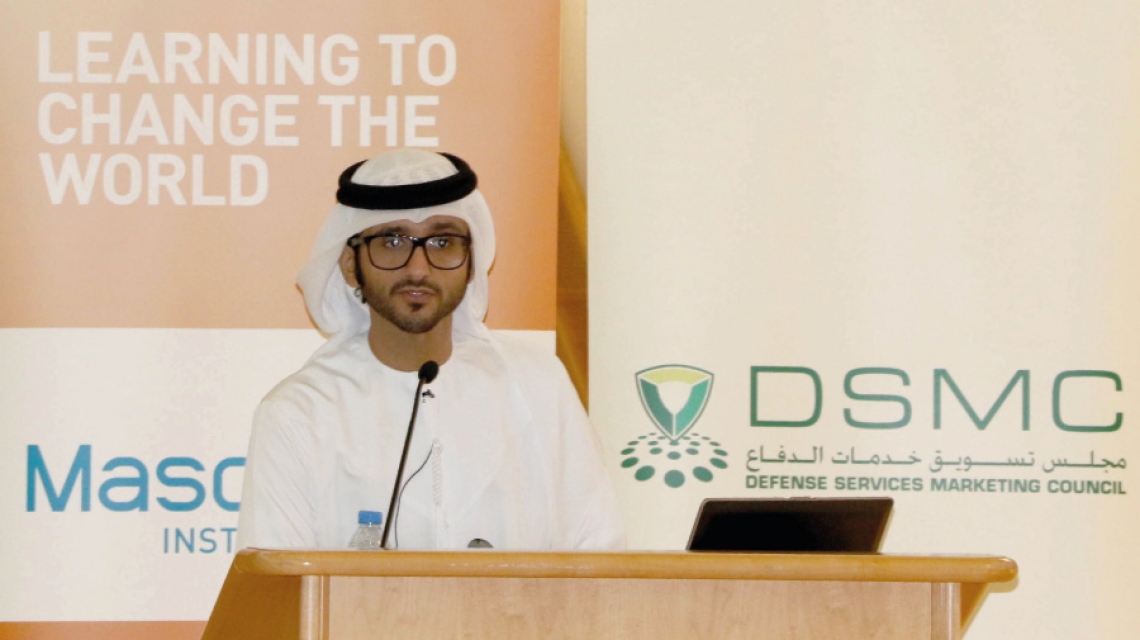
Innovation is often the result of the dynamic synergies that emerge when academia and industry work in partnership toward a shared goal, which is exactly what took place when Masdar Institute partnered with YahSat and Orbital ATK, explained Dr. Saif Al Mheiri, Assistant Professor of Mechanical and Materials Engineering at Masdar Institute, at the recent Partnering to Achieve Innovation in Defense and Aerospace (PAIDA) Working Group.
The innovation that emerged from the strategic collaboration between the research institute, the satellite company and the aerospace manufacturer is the development of Masdar Institute’s new Space Systems and Technology concentration.
The PAIDA event – which was organized by the Defense Services Marketing Council (DSMC) and was the fourth in a series of focused discussions around innovative defense and aerospace technologies and their potential applications in the UAE – provided Dr. Al Mheiri an opportunity to present a summary of the Gulf Cooperation Council’s (GCC) first-ever space concentration to the working group members and interested Masdar Institute students.
“Partnering with industry experts like YahSat and Orbital ATK ensures that the concentration will develop valuable technologies of direct relevance to the space industry, as well as the highly skilled human capital required to power the UAE’s nascent space sector,” Dr. Al Mheiri said.
The assistant professor is one of four Masdar Institute faculty responsible for developing the concentration, which leads students through the design, construction, and testing of a CubeSat, or mini satellite. He is joined by Dr. Mohamed Sassi, Dean of Faculty, Dr. Prashanth Marpu, Assistant Professor of Chemical and Environmental Engineering, and Dr. Daniel Choi, Associate Professor of Mechanical and Materials Engineering.
“We have developed an interdisciplinary concentration that spans seven engineering programs to facilitate the education of space systems and technology across the engineering spectrum,” Dr. Al Mheiri explained.
Through YahSat and Orbital ATK’s support, Dr. Al Mheiri shared the milestones he expects to reach within the first two years of the space concentration.
The first milestone, set for June 2016, is to complete an orbit analysis, a design for a ground station, and the basic designs for the CubeSat subsystems. The second milestone, set for December of 2016, includes the breadboard model of the CubeSat, which is the stage just before the prototype is constructed. The third milestone, set for December of 2017, includes the construction of the CubeSat and the required compliance checks.
“The local human and intellectual capital the program produces can provide the country with valuable products and services to power its knowledge economy, particularly in the space sector, but also in other high-tech sectors as well,” Dr. Al Mheiri concluded. He believes the technological systems and intellectual property developed through the concentration will lead to advances in other key UAE sectors, including defense and energy.
Since the Fall 2015 term, when the concentration first launched, 12 students from seven of Masdar Institute’s Master’s programs – including Mechanical Engineering, Materials Science and Engineering, Computing and Information Sciences, Electrical Engineering, Engineering Systems and Management, Microsystems Engineering and Water and Environmental Engineering – have added a concentration in Space Systems and Technology to their degree.
YahSat is funding the program, which includes a lab with all of the required machinery needed to construct and test the CubeSats. The lab is expected to be completed by the end of the first quarter of 2017. The satellite company also provided an Initiation Program before the first semester began, which offered 16 hours of seminars to introduce new students to concepts related to satellite business, engineering and operations. The satellite manufacturing company will continue to mentor the students and faculty involved in the concentration to ensure the program’s quality and ability to develop the highly-skilled human capital needed to advance the UAE’s nascent space industry.
Orbital ATK assisted in the development and launch of the space concentration and will continue to play an advisory role through regular analysis of coursework and curriculum recommendations. They will also provide the required testing facilities for the CubeSats that are developed by Masdar Institute students, and will subsequently launch the CubeSats into space.
Erica Solomon
News and Features Writer
16 February 2016